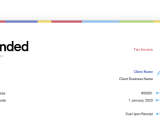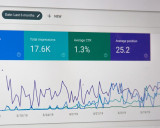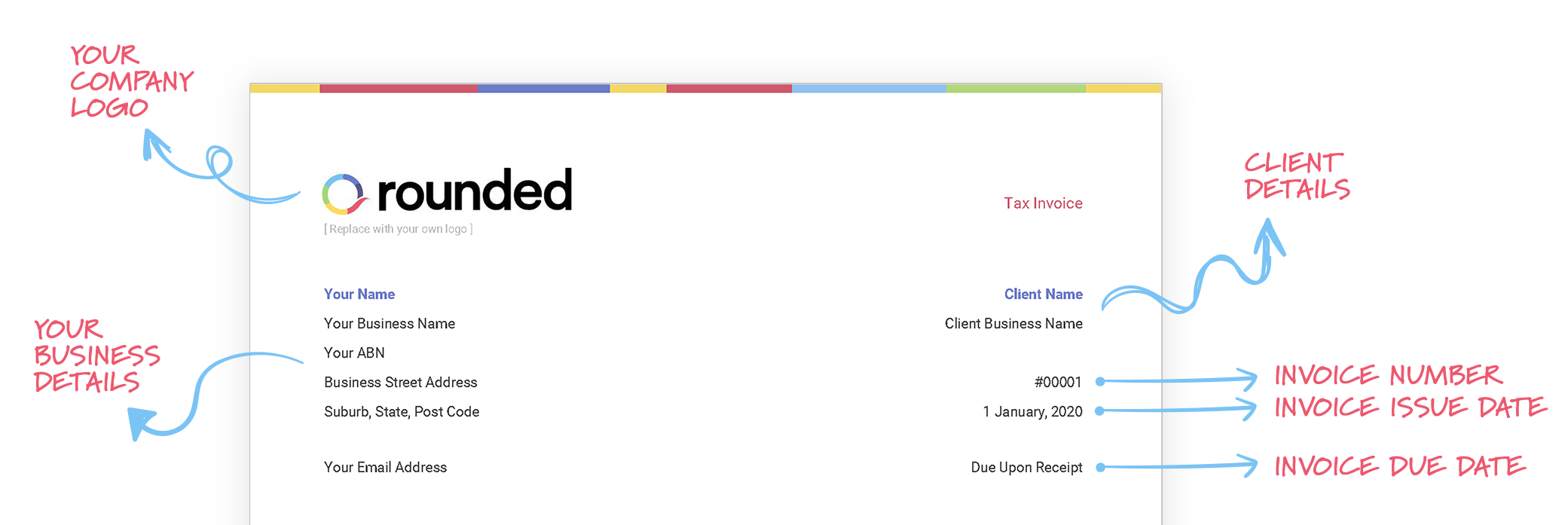
Sole Trader vs Company. What’s the difference?
When turning your idea or passion into a business, one of the first decisions you’ll make is whether to set up as a sole trader or a company. This guide will help you understand how these two structures differ and how to choose the one that’s best for you.
Article contents
− +- Introduction
- Sole trader vs. Company: Freelancers usually come up against this decision when they’re launching their business.
- Overview: Key considerations when choosing a business structure
- Sole Trader vs. Company: Starting Costs
- Liabilities and business debt considerations
- Paying taxes as a sole trader vs. company
- Employing staff as a sole trader vs. company
- Paperwork and ongoing costs
- Wrapping up

This article was updated in May, 2025. All costs and fees outlined below are current as of that date.
Sole trader vs. Company: Freelancers usually come up against this decision when they’re launching their business.
Those who start out as sole traders may face it again, as their business grows and they begin to bring on employees or want to reduce their business liability.
This guide will cover much of what you need to consider when deciding what business structure you want.
Remember: This article has been reviewed by a tax expert, but it’s always best to seek professional advice. A tax professional or business consultant will be able to guide you to the best option, based on your personal circumstances. Here’s our guide to hiring an accountant or bookkeeper.
Overview: Key considerations when choosing a business structure
For most early-stage freelancers, registering as a sole trader is the simplest way to start a business. Setting up as a sole trader requires fewer steps, and lower administration fees up front make it an attractive choice, especially for solo operations.
However, registering as a sole trader also has different tax implications, and it means you could be personally liable for your company’s debts and legal fees going forward.
We will go into the detailed pros and cons of both options, but here is a quick comparison of sole-trader vs. company designations:
Feature | Sole Trader | Company |
Setup Process | Quick and uncomplicated | More involved, requires ASIC registration |
Initial Costs | Lower, mostly business name fee | Higher, includes larger company registration fee |
Personal Risk | Full liability for personal debts and legal actions | Limited liability protection |
Tax structure | Follows individual income tax rates | Flat company tax rates often apply |
Administrative Work | Light, only basic reporting | Heavier, more comprehensive reporting |
Growth Potential | Ideal for small-scale or solo operations | Better for expansion and scaling a business |
It's worth noting that your initial choice isn't permanent. You have the flexibility to transition between structures as your business evolves. Many businesses start out with the sole trader designation and then reorganise as a company once they are ready to hire additional employees, for example.
Nonetheless, selecting the most appropriate option from the outset can prevent unnecessary complications and paperwork down the track.
Now, let's delve deeper into these key differences to guide your decision.
Sole Trader vs. Company: Starting Costs
The first consideration comes down to cost: The startup fees for these two structures are slightly different.
In general, there aren’t a lot of up-front costs involved when starting a business as a sole trader. No matter what structure you choose, you’ll need to start by registering for an ABN, which is free.
Once you’ve got an ABN, you may choose to register a business name, which costs $44 for a single year or you can score yourself a discount and register for 3 years at $102.
If you choose to set up as a sole trader, registering your business name is the only upfront cost.
However, registering as a company is more expensive, with a fee ranging between$491 and $597. You also may need to register your business name (and pay the fee).
Here’s a list of all fees associated with registering as a company, from the Australian Securities and Investments Commission (ASIC):
Fees for setting up a business:
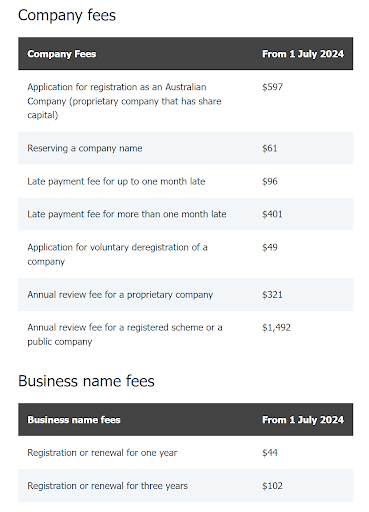
A fee of $597 may not seem like too much to set up your business as a company, but Holly Shoebridge, a tax professional and director of Oceans Accounting, offers this advice:
Setting up a company involves some complex documentation and procedures that need to be handled correctly from the start. That's why I strongly advise enlisting the help of an expert when establishing a company. Beyond just guiding you through the company registration process, a professional can offer valuable insights on GST, ABN, and TFN registrations, obligations for directors and officeholders under the Corporations Act, and the more stringent reporting and bookkeeping requirements for company. While it may seem like an extra expense initially, investing in this expertise early on can lead to significant cost savings in the long run.
Liabilities and business debt considerations
This is one of the larger and more important differences between a sole trader vs. a company. Understanding your liability and what it means for you personally is crucial.
As a sole trader, there is no division between you as an individual and you as a business in the eyes of the Australian government. You are personally liable for all financial and tax debt your business incurs. This also means there is no distinction between personal assets and business assets. Things like your home and car can be used to repay any outstanding debt in your name.
A key advantage of a company structure over a sole trader is the ability to limit your personal liability. This is not a “get out of jail free” card; you’ll still be liable for business debts, and if you’re the director of the company, you’ll be liable for pay as you go (PAYG) withholding and superannuation debts for your employees.
One of the primary motivations for sole traders to transition to a company structure is the clear distinction it creates between personal and business assets," notes Holly Shoebridge, tax specialist at Oceans Accounting. Consider a scenario where a sole trader owns their residence, has invested in property, or holds a stock portfolio. In the event of unpaid business debts or legal issues stemming from business activities, these personal holdings could be at risk. Understandably, some find this potential exposure concerning. That's why many entrepreneurs opt for incorporating their business rather than operating as a sole trader – it provides a layer of protection for their personal assets.
She adds that though a company designation does provide a separation between personal and business assets, in the rare event of negligence or intentional wrongdoing, a court can "pierce the veil" of a company to hold company owners and directors liable.
Paying taxes as a sole trader vs. company
When it comes to tax, sole traders and companies are viewed differently by the ATO.
Paying tax as a sole trader is simple; they are taxed at the same rates as an individual. We’ve previously written a handy article on tax for sole traders which explains income tax and GST in some more detail.
Sole traders enjoy a tax-free threshold set at $18,200, meaning you won’t be taxed on any income under that amount. Once you pass that threshold, your tax rate depends on how much you earn in the year.
“The current flat tax rate for a company is 25%, which is a great consideration for sole traders that may be paying tax in the higher personal income tax brackets,” says Shoebridge. “That said, it is important to keep in mind that the personal services income rules can mean that even if a business is incorporated, if there is a single individual within the entity that provides services, the related income must be distributed to that person, rather than being retained in company at the lower 25% tax rates. When that occurs, the viability of incorporating purely for access to flat company tax rate is not always available.”
Here’s a breakdown of the tax brackets for individuals and sole traders:
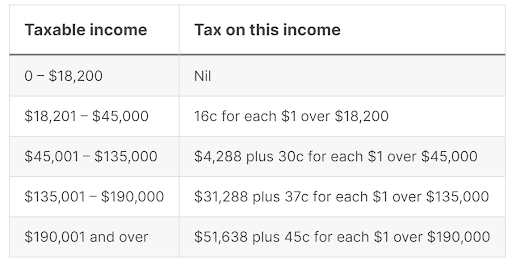
If you register as a company, there is no tax-free threshold. Every dollar you make will be taxed, typically at a rate of 30%.
Lodging your taxes is also a bit more complicated if you set up as a company. Sole traders need only submit an individual tax return once a year, and make quarterly tax payments. If you register your business as a company, you’ll need to file your own personal return (even if you are director), as well as a tax return on the company’s income and deductions.
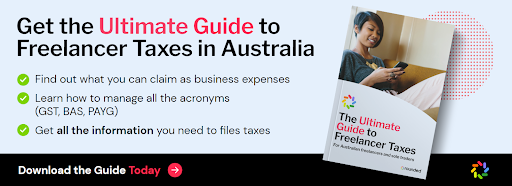
Employing staff as a sole trader vs. company
Hiring a new member of your team is exciting, but there are certain tax, super, and insurance obligations you should be aware of.
No matter what business structure you choose, you may be required to obtain workers compensation insurance and pay super for your employees. (Note: Each state has its own thresholds for when you need to obtain worker’s comp. Check with your state government website for more info..)
We have guides that explain both insurance and super in more details here:
Freelancer and Sole Trader Insurance: An Overview
Your guide to sole trader superannuation
Paperwork and ongoing costs
As you might expect, the simpler the business structure the less demanding the paperwork, reporting and ongoing costs will be.
In terms of ongoing paperwork, the two key reports that need to be lodged with the ATO are an individual tax return and a business activity statement (BAS). Keep in mind that lodging a BAS is not always necessary if you’re not registered for GST. To learn more about GST and if you should register, check out our guide:
Records must be kept for at least 5 years, either paper records or electronic will keep the ATO happy. Using Rounded, our accounting software for sole traders, makes record keeping super simple and automated in most cases.
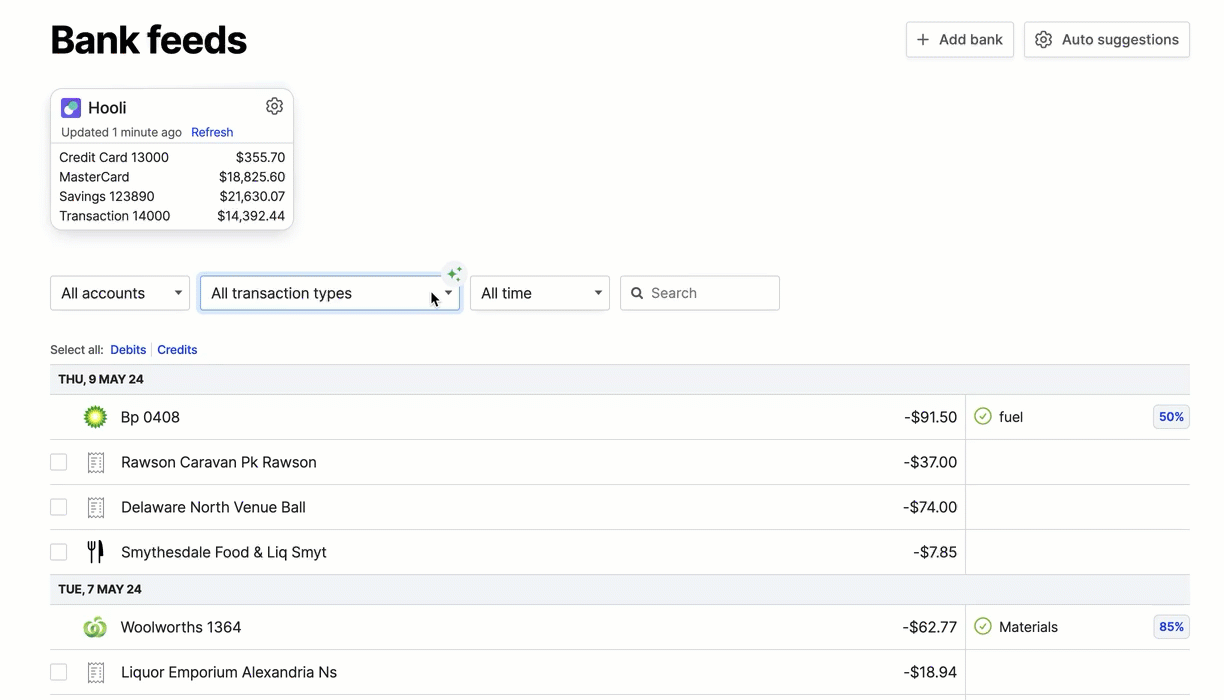
Ongoing costs are again minimal, if you have registered a business name it’ll set you back just $42 for a single year or $102 for three years. When you re-register, you can sign up for automatic reminders to come through three days before your next renewal is due, so you don’t end up paying late fees.
A company structure is generally more complex, and it requires more paperwork. A company must lodge an independent tax return in addition to your individual return and must keep financial records for a minimum of 7 years.
A separate bank account is also mandatory for companies. The fees and level of paperwork required will vary by institution. Check out our guide to business bank accounts for more info.
Companies are subject to an annual review by ASIC, which attracts a $321 fee for a proprietary company. Most freelance companies will fall under this category, but for other unique types of businesses, you can see the full fee structure here.
Wrapping up
Choosing a business structure depends not only on your initial ambitions but also where you see yourself and your business in a few years down the track. Sole traders enjoy a lot of simplicity upfront but may miss out on some of the benefits of a fully-fledged company.
This information is not financial advice. Be sure to speak to your financial advisor or accountant to get the right advice specific to your circumstances.
Cover photo by Jakob Owens on Unslpash
Contents
- Introduction
- Sole trader vs. Company: Freelancers usually come up against this decision when they’re launching their business.
- Overview: Key considerations when choosing a business structure
- Sole Trader vs. Company: Starting Costs
- Liabilities and business debt considerations
- Paying taxes as a sole trader vs. company
- Employing staff as a sole trader vs. company
- Paperwork and ongoing costs
- Wrapping up
Join newsletter
ABOUT ROUNDED
Invoicing and accounting software for sole traders. Get paid faster and relax at tax time.
